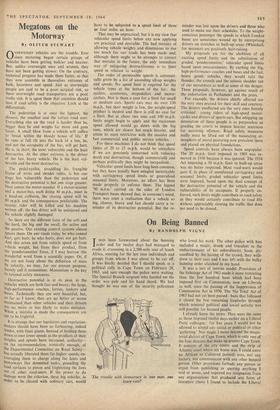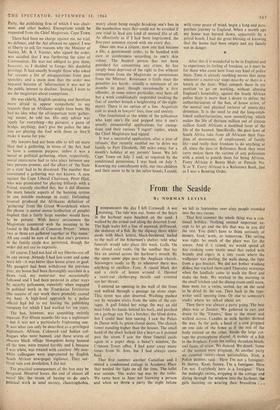On Being Banned
By RANDOLPH. VIGNE
T HAD been forewarned about the banning j order and for twelve days had managed to evade it, cramming in a 2,500-mile tour of South Africa, meeting for the last time individuals and groups from whom I was about to be cut off. It was finally decided that I should speak at a political rally in Cape Town on February 28, 1963, and sure enough the police were waiting. The Special Branch sergeant who handed me the order was pale and his hand shook. We had thought he was one of the security policemen
'The trouble with democracy is, one man, one louly voter
who loved his work. The other police with him included a major, drunk and truculent to the embarrassment of his subordinates. Soon, dis- comfited by the hissing of the crowd, they with- drew to their cars and I was left with the bulky banning order clutched in my hand.
It was a sort of interim model. Provisions of the Sabotage Act of 1962 made it more restricting than the few hundred bans which had been imposed first on Communists, now on Liberals as well, since the passing of the Suppression of Communism Act in 1950. The 'No Trial' Act of 1963 had not yet been passed: bans that followed it closed the few remaining loopholes through which minimal political and social activity was still possible for banned people.
I already knew the terms. They were the same as those imposed twelve days earlier on a Liberal Party colleague : for five years I would not be allowed to attend any social or political or other 'gathering.' Nor might I move beyond the magis- terial district of Cape Town, which is only one of the four districts that make up greater Cape Town. It consists of the city centre and the strip of Atlantic coast where my home was. I could enter no African or Coloured (mixed) area, nor any factory, nor communicate with any other banned person. Other provisions forbade any person or organ from publishing or quoting anything I said or wrote, and required my resignation from any organisations that produced any form of literature (these I found to include the Liberal Party, the publishing firm of which I was chair- man, and other bodies). Exemptions could be requested from the Chief Magistrate, Cape Town.
There had been no charge against me, no trial, no defence, and the Act allowed no appeal. I was at liberty to ask for reasons why the Minister of Justice, Mr. B. J. Vorster, who signed the order, was satisfied that I was furthering the aims of Communism. He was not obliged to give them, however, so I decided to forego this doubtful privilege. It had usually brought those who asked for reasons a list of misquotations from past speeches, and a main item that the order was imposed because of 'information it was not in the public interest to disclose.' Instead, I went to see the magistrate about exemptions.
He was elderly, English-speaking and therefore more afraid to appear sympathetic to my requests than an Afrikaner might have been. He had no idea what the all-important term 'gather- ing' meant, he told me. His only advice was 'apply for everything—the pictures, a game of bridge, anything; don't give the police the idea you are playing the fool with them or they'll make it worse for you.'
My lawyers had not been able to tell me more than that a gathering, in terms of the Act, had to have a common purpose, unless it was a social or political gathering, when, respectively, social intercourse had to take place between any two persons present, and the affairs of 'the State or a state' had to be discussed. The number that constituted a gathering was not known. A case against the Cape Liberal Chairman, Peter Hjul, who was prosecuted for playing billiards with a friend, scarcely clarified this, but it did illumine the more lunatic aspects of the banning system in one notable exchange in court. Defending counsel produced the Afrikaans definition of 'gathering' from the Groot Wdordeboek where the phrase 'n aantal mense (collection of people) implied that a fairly large number would have to be present. With heavy seriousness the Magistrate countered with the meaning to be found in the Book of Common Prayer : 'where two or three are gathered together in Thy name.' All one could be sure of was that one's presence in the family circle was permitted, though the order did'not say so expressly.
Of course, I had not had all my liberties cut off in one swoop. Already I had lost some and some were left—it was better than house arrest or gaol. My passport had been withdrawn the previous year, my house had been thoroughly searched in a dawn raid, my motor-car was occasionally followed and I had been pestered in other ways by security policemen, especially when engaged in political work in the Transkeian Territories (the success of our work there probably. ,caused my ban). A high-level approach by a 'police oflicial had led to my leaving the publishing company for which I had worked for ten years.
The ban, however, was something entirely separate. For fifteen months life was a nightmare —but it was not a particularly frightening one. It was what can only be described as a privileged nightmare. African, Coloured and Indian col- leagues who were banned, and those scores of obscure black village Hampdens being banned all the time, were treated harshly and I, because I was white, was treated with courtesy. My non- white colleagues were unprotected by English South African newspaper Vigilance. They suf- fered ruin and desolation, I did not.
The practical consequences of the ban may be imagined. Material losses, the end of almost all social life, the strain of having to do one's Political work in total secrecy, claustrophobia, worry about being caught breaking one's ban in the numberless ways that could not be avoided if one tried to lead any kind of normal life at all. As effectively as if I had been imprisoned, the five-year sentence stayed with me every day.
Once one was a citizen; now one had become a file, a government order, to be handled with care or carelessness according to one's skin colour. The banned person has not been punished for committing any crime, he has simply been deprived of the right to live without exemptions from the Magistrate or permissions from the Minister. Resistance is futile since the penalties are harsh : usually a minimum of six months in gaol, though occasionally a first offender, in some minor particular, may have all but a week conditionally suspended (making the fear of another breach a heightening of the night- mare). There is no option of a fine. Acquittals cost as much in lawyers' fees, time and anxiety.
One functioned at the whim of the policeman who kept one's file and popped into it one's usually unsuccessful applications for exemp- tions and their curious 'I regret' replies, which the Chief Magistrate had signed.
It was a successful application, after a year of refusals,' that recently enabled me to drive my family to Port Elizabeth, 500 miles away, for a month's holiday at my parents' home. We left Cape Town on July 2 and, as required by the conditional permission, I was back on July 5. Knowing my convalescent wife, our two children and their nurse to be in the safest hands, I could, with some peace of mind, begin a long and pass- portless journey to England. When a month ago my house was burned down, apparently by a petrol bomb, I had the great blessing of knowing that the house had been empty. and my family not in danger.
After this it is wonderful to be in England and to experience its feeling of freedom, as it must be for those who come here from any kind of police State. Time is already soothing nerves that jump whenever a motor-car stops near-by or there is a knock at the door. What compels those in my position to go on working, without abusing England's hospitality, against the South African police State is more than a desire to defeat the authoritarianism of the ban, of _house arrest, of the mental and physical tortures of ninety-day detention. It is the need to end the long-estab- lished authoritarianism, now intensifying, which makes the life of thirteen, million out of sixteen million South Africans a modified form of the life of the banned. Specifically, the pass laws of South Africa take from all Africans their free- dom of movement, of employment, of family life—and really their freedom to do anything at all, since the pass or Reference Book they must carry makes them the victims of any policeman with a mind to punish them for being African. Every African is Bantu Male or Female No. X or Y. Every African is a Reference Book, just as I was a Banning Order.



































 Previous page
Previous page